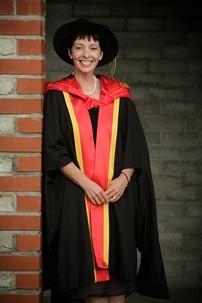Best Thesis Award - two in a row for Liggins students
Dr Deborah Harris has become the latest Liggins Institute PhD graduate to be recognised with a Vice-Chancellor’s Best Doctoral Thesis prize.
Deborah’s achievement follows that of another recent Liggins graduate Dr Chris McKinlay who won one of last year’s prizes. Other previous winners include Professor Frank Bloomfield a principal investigator with the Liggins Fetal, Perinatal and Maternal Translational Research Group and Associate Professor Mark Vickers, the Institute’s Academic Director and principal investigator in developmental programming research.
Dr Harris’ graduation last year was another career milestone for one of the country’s first Nurse Practitioners to be granted prescribing rights by the NZ Nursing Council. Her PhD project spanned six years of part-time research alongside her role in the Neonatal Intensive Care Unit at Waikato Hospital. She has always maintained that she wanted her research to make a difference to the sick and preterm babies she encountered daily in the neonatal nursery.
For her PhD Deborah investigated the effects of low blood glucose concentrations in newborn babies. The condition, known as hypoglycaemia, is a common problem and is a preventable cause of brain damage in newborns. “At present we don’t know which babies will have problems or how severe or frequent the hypoglycaemia needs to be to cause damage,” she says.
During her research, Deborah trialled a new device that continuously monitors glucose concentrations in babies at risk. She is now a member of the Steering Group for the CHYLD study, which is following up the children that she recruited as newborns and assessing their health, vision and physical and cognitive development at two and four and a half years of age.
Her work has led to a number of publications in highly regarded medical journals including the Journal of Pediatrics and the Lancet. The latter attracted widespread media coverage last year; in the article Deborah and colleagues reported that, for some babies, neonatal hypoglycaemia could be treated inexpensively and effectively with oral absorption of dextrose gel. This meant that fewer babies required admission to intensive care for treatment of hypoglycaemia - and the consequent separation from mothers and potential interruption of breast feeding.
“This important study is already changing the way newborn babies are treated around the world” said Distinguished Professor Jane Harding, who was Deborah’s primary supervisor.
A multicentre controlled trial is now underway to determine whether this simple treatment can also be used to prevent the onset on hypoglycaemia in at-risk newborns.
Advising Deborah of her award, University of Auckland Dean of Graduate Studies Associate Professor Caroline Daly said that just five prizes were available for the very best of the 321 doctoral degrees awarded by the University in 2013. The judging panel reviewed 18 theses submitted by faculties, ranking them by significance in the field, originality and excellence of research, exceptional academic and intellectual achievement, and timely completion.
Deborah says she feels humbled by the award but at the same time delighted for the team. “The award is a reflection of the work we do at the Liggins,” she says.
Dr Harris’ thesis Neonatal Hypoglycaemia was supervised by Distinguished Professor Jane Harding with co-supervisors Associate Professor Chris Williams, Dr Malcolm Battin and Dr Phil Weston. Her award will be formally recognised at the Celebrating Research Excellence event on 02 May.
-
SUPPORTING US








